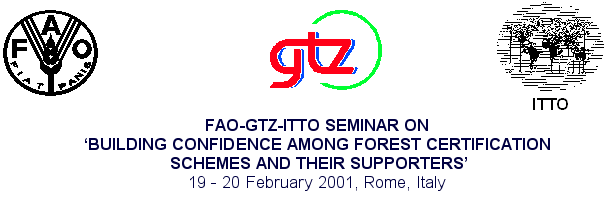



Ladies and Gentlemen
It is also for me a great pleasure to see you all here, to see so many familiar faces, and to register the variety of different parties presented today.
Allow me to add some words regarding the background of this seminar, what it is about, and what FAO's role is.
WHY THIS MEETING?
FAO's aim in joining with GTZ and ITTO to host this seminar is to assist the process of encouraging improved forest management.
As mentioned by the ADG, one tool in this is the certification of forests and the associated labelling of forest products. Certification schemes continue to be in a continual state of flux, with many aspects and issues still being debated and developed. As a result of the expanding number of certification schemes, there have been increasing calls for efforts to achieve some degree of international comparability and to consider their equivalency.
The Intergovernmental Forum on Forests (IFF) recognized voluntary certification of forest management and labelling of forest products as one amongst a number of potential tools for promoting sustainable forest management and differentiating forest products and services in the marketplace.
The IFF report to the Commission on Sustainable Development (CSD) in March 2000 also urged countries, international organizations, and other interested parties to undertake further cooperative work on voluntary certification and/or labelling schemes. It noted that
"The proliferation of certification and/or labelling schemes calls for further cooperative work, in line with IPF recommendations, towards achieving their international comparability and considering their equivalency while taking into account the diversity of national and regional situations".
It suggested, inter alia, the importance of ensuring adequate transparency and non-discrimination in the design and operation of such schemes, while ensuring that they are consistent with international obligations, so that they promote sustainable forest management and do not lead to unjustifiable obstacles to market access.
Earlier reluctance to discussing questions of comparability, equivalence, harmonization and mutual recognition etc. of the different certification processes is changing. As reflected by the presence of all of you, there is now a greater willingness to acknowledge that many different certification processes have merit and may even be acceptable alternatives.
FAO is an international organization with a global coverage for issues dealing with all kinds of forests, and types of forest products. As part of its programme FAO has maintained a close involvement with certification over the years, and the present seminar is one further step in this. We want to ensure that the views of the different parties involved will be incorporated into the process of developing certification schemes in a balanced way.
Most of FAO's Regional Forestry Commissions discussed the topic of certification and labelling at their various meetings last year. Many, such as the eighteenth session of the Asia-Pacific Forestry Commission, which was held in May 2000 in Australia, expressed support for further efforts by FAO to ensure a greater degree of mutual recognition between different certification schemes. This request was also raised during both the 1999 and the 2000 session of FAO's Advisory Committee on Paper and Wood Products. In hosting this Seminar here in Rome we are responding to these requests from our Members.
In one session today we shall discuss Criteria and Indicators (C&I) and its links to certification. FAO has been involved in the C & I process. We hosted an expert consultation on Criteria and Indicators in collaboration with UNEP, ITTO, CIFOR, and IUFRO here in Rome in November 2000, and the results of that meeting are available on the table outside.
This seminar aims to improve dialogue and contact, and thus to build confidence. It seeks to increase understanding, and build on the willingness of all involved with certification to work together.
The seminar seeks to build on other, earlier efforts that have addressed some of the issues to be discussed here. The most recent of such meetings have been two on Mutual Recognition held in Brussels last year - hosted by the PEFC and CEPI respectively. Many of you have attended one or both of these earlier meetings, and have already been working on this topic. One of our aims is to extend the coverage of these earlier meetings to a broader range of groups, especially the developing countries and civil society. We hope the seminar will help us to more clearly recognize the key issues that need to be considered when looking at comparability of schemes.
We expect a constructive debate to identify open questions that require further work and discussion, and hope that at the end of these two days we shall have developed some points of agreement which may lead to concrete initiatives for further collaboration, rather than concentrating on perceived differences between the schemes.
FAO hopes that this seminar, as a neutral forum, will facilitate newcomers to the discussions, particularly those from developing countries and civil society, to participate in the debate, discussion and action surrounding comparability and equivalence of credible forest certification schemes.
We want to:
· assist to improve linkages between the different actors;
· assist in enabling a forward looking dialogue;
· encourage some form of improved collaboration or mutual recognition; and
· ensure the participation of all parties concerned in the process and in any actions that are taking place.
We hope that rather than concentrating on defining the differences between processes we concentrate on the common goal- that is the sustainable management of forests, and "with building confidence" make a further step towards that goal.
Ladies and gentlemen, with the parties presented here today we have a great opportunity to get one step further towards a harmonization of different certification schemes.
Let us grasp that opportunity!
Thank you.